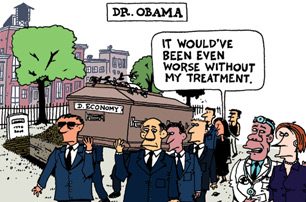
A Middle East Without American Influence?That's the logical outcome of the Obama administration's current policies.
Posted Wednesday, March 17, 2010, at 4:47 PM ET Last week, one of Syria's government news organs riffed on the title of my book The Strong Horse; Power, Politics, and the Clash of Arab Civilizations. "The American president," Al Tharwa wrote, "was betting on the sick horse." Instead of siding with Syria's Hamas allies, Obama was backing the Palestinian Authority and its leader, Fatah's Mahmoud Abbas. From Damascus' perspective, the description also applies to the United States' other Arab allies, like Saudi Arabia and the Gulf sheikhdoms, as well as to Egypt and Jordan. These states are ready to be put out to pasture, while it is Iran's "axis of resistance," including Hezbollah and Hamas, as well as Syria itself, that represents the rising power.
Last week, one of Syria's government news organs riffed on the title of my book The Strong Horse; Power, Politics, and the Clash of Arab Civilizations. "The American president," Al Tharwa wrote, "was betting on the sick horse." Instead of siding with Syria's Hamas allies, Obama was backing the Palestinian Authority and its leader, Fatah's Mahmoud Abbas. From Damascus' perspective, the description also applies to the United States' other Arab allies, like Saudi Arabia and the Gulf sheikhdoms, as well as to Egypt and Jordan. These states are ready to be put out to pasture, while it is Iran's "axis of resistance," including Hezbollah and Hamas, as well as Syria itself, that represents the rising power.
OK, maybe the regime in Damascus hasn't actually read my book. I lifted the title from Osama Bin Laden, anyway. "When people see a strong horse and a weak horse," said Bin Laden, "by nature, they will like the strong horse." But the Syrian appraisal confirms my thesis—in the Middle East, political power is the prerogative of those who take it and maintain it by both the appearance and application of force. In this instance, unfortunately, what's good for my book is very bad for U.S. interests and allies—and for American citizens.
As it turns out, the Syrians have a point. Saudi Arabia has the world's largest known oil reserves, and Egypt is the most populous Arab state, but they are no longer regional powerhouses, at least in the way the Arabic-speaking Middle East has typically registered power over the last 60-plus years—that is, as willingness to fight Israel. Cairo and Amman have peace treaties with Israel, the Palestinian Authority is involved in an on-again-off-again peace process, while Riyadh has opted to remain on the sidelines. This collective weakness is just the way that Washington ordained it four decades ago.
In the middle of the 1973 Arab-Israeli war, Henry Kissinger airlifted arms shipments to Israel in order to guarantee an Israeli victory that for a time had seemed uncertain. Kissinger's strategic intention was to show the Arabs that as long as Washington stood behind Israel, there was no way they could ever defeat the Jewish state. If they wanted concessions from Israel, they would have to petition the Americans for it, a prerogative that made Washington not merely a great power but a power broker. By breaking the Arabs, the United States made itself the regional strong horse.
Of course, with those arms shipments, Kissinger meant to drive home another lesson as well, this one to Israel—in effect, that Washington held the power of life and death over the Jewish state and that Israeli leaders had best keep in line. This arrangement—Israeli strength and Arab weakness—secured what some have called the Pax Americana of the Middle East. After Egyptian President Anwar Sadat jumped from the Soviet side to the American one after the '73 war, our regional hegemony was never again seriously contested—until now.
The new catch phrase in the Middle East is strategic realignment. Broadly speaking, this means that the balance of power is shifting from the U.S.-backed regional order to the axis of resistance. Some commentators, like Robert Malley, have argued alongside the Syrians that the Obama administration should drop its old allies—the sick horse—for new friends among the axis of resistance. From a certain perspective, it appears that the White House has done just that, albeit unintentionally.
When the Obama administration promised to engage the adversaries that the Bush White House had isolated, U.S. allies followed the strong horse's lead and also changed course. Most notably, the Saudis patched things up with the Syrians after five years of intra-Arab discord. Riyadh pushed its Lebanese allies to reconcile with Damascus, and with Beirut's pro-democracy and pro-United States March 14 movement now all but dead, Washington no longer has a Lebanese ally. When President Barack Obama indicated that the most important thing concerning Iraq was to withdraw U.S. forces, the Syrians and Saudis found a shared interest in attacking Prime Minister Nuri al-Maliki. Even as Maliki, his Iraqi security officials, and Gen. Raymond Odierno, the top U.S. commander in Iraq, explained that the Syrians were behind a series of mega-terror attacks in Baghdad, the White House hushed them up for fear that identifying Syria as responsible for the attacks would jeopardize its efforts to engage Damascus. It is lost on no one in the region that Washington left two allies out on their own. But it gets worse.
Some U.S. commentators have praised the Obama administration's recent condemnation of Israel for announcing, during Vice President Joe Biden's visit, that it intended to build 1,600 apartment units in East Jerusalem. The White House's response, they argue, sends a strong message that Washington won't be bullied. In the Middle East, however, there is nothing that reeks so much of weakness as beating up on an ally in public. Moreover, this tongue-lashing comes shortly after the White House swallowed the open taunts of its adversaries. At a recent Damascus banquet featuring Iranian President Mahmoud Ahmadinejad, Hezbollah's Hassan Nasrallah, and Hamas' Khaled Meshaal, Syrian President Bashar Assad openly mocked Secretary Hillary Clinton. He joked that he had misunderstood her demands that Syria distance itself from Iran, so instead, said Assad, he was waiving visa requirements for visitors from the Islamic Republic of Iran.
on the Fray
-
French TV show reenacts Milgram experiment http://bit.ly/9veo1k
-
Christiane Amanpour set to replace George Stephanopoulos at This Week http://nyti.ms/9Xs2hq
-
130 House Republicans voted no on a resolution congratulating UMD basketball team http://bit.ly/cptiK5
 Spitzer: Only a Shareholder Revolution Can Fix Wall Street
Spitzer: Only a Shareholder Revolution Can Fix Wall Street I Want To Do Volunteer Work Abroad for My Vacation. Will It Do Any Good?
I Want To Do Volunteer Work Abroad for My Vacation. Will It Do Any Good? Shafer: The Most Bone-Headed Pharm-Party Article I've Ever Read
Shafer: The Most Bone-Headed Pharm-Party Article I've Ever Read Why Won't Insurance Companies Cover Fertility Treatments for Single Women?
Why Won't Insurance Companies Cover Fertility Treatments for Single Women? The Investment That Forces You To Root for the Demise of the United States
The Investment That Forces You To Root for the Demise of the United States Can the Pope Get Fired?
Can the Pope Get Fired?














